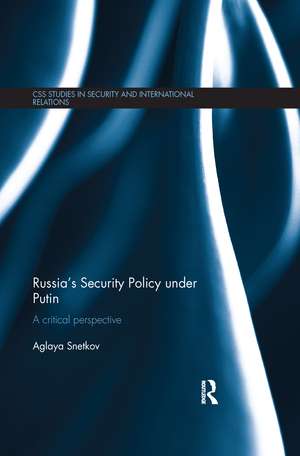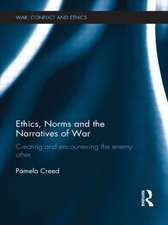Russia's Security Policy under Putin: A critical perspective: CSS Studies in Security and International Relations
Autor Aglaya Snetkoven Limba Engleză Paperback – 28 iun 2016
Drawing on critical approaches to security the book investigates the interrelationship between the internal-external nexus and the politics of (in)security and regime-building in Putin’s Russia. In so doing, it evaluates the way that this evolving relationship between state identities and security discourses framed the construction of individual security policies, and how, in turn, individual issues can impact on the meta-discourses of state and security agendas. To this end, the (de)securitisation discourses and practices towards the issue of Chechnya are examined as a case study.
In so doing, this study has wider implications for how we read Russia as a security actor through an approach that emphasises the importance of taking into account its security culture, the interconnection between internal/external security priorities and the dramatic changes that have taken place in Russia’s conceptions of itself, national and security priorities and conceptualisation of key security issues, in this case Chechnya. These aspects of Russia’s security agenda remain somewhat of a neglected area of research, but, as argued in this book, offer structuring and framing implications for how we understand Russia’s position towards security issues, and perhaps those of rising powers more broadly.
This book will be of much interest to students of Russian security, critical security studies and IR.
| Toate formatele și edițiile | Preț | Express |
|---|---|---|
| Paperback (1) | 386.51 lei 6-8 săpt. | |
| Taylor & Francis – 28 iun 2016 | 386.51 lei 6-8 săpt. | |
| Hardback (1) | 1166.80 lei 6-8 săpt. | |
| Taylor & Francis – 3 dec 2014 | 1166.80 lei 6-8 săpt. |
Din seria CSS Studies in Security and International Relations
- 18%
 Preț: 1054.71 lei
Preț: 1054.71 lei -
 Preț: 445.56 lei
Preț: 445.56 lei -
 Preț: 413.55 lei
Preț: 413.55 lei -
 Preț: 408.74 lei
Preț: 408.74 lei - 12%
 Preț: 352.21 lei
Preț: 352.21 lei -
 Preț: 416.96 lei
Preț: 416.96 lei -
 Preț: 484.35 lei
Preț: 484.35 lei - 17%
 Preț: 295.45 lei
Preț: 295.45 lei -
 Preț: 447.51 lei
Preț: 447.51 lei -
 Preț: 414.32 lei
Preț: 414.32 lei -
 Preț: 279.72 lei
Preț: 279.72 lei - 17%
 Preț: 259.98 lei
Preț: 259.98 lei - 12%
 Preț: 299.52 lei
Preț: 299.52 lei - 16%
 Preț: 262.14 lei
Preț: 262.14 lei - 18%
 Preț: 840.56 lei
Preț: 840.56 lei -
 Preț: 489.30 lei
Preț: 489.30 lei -
 Preț: 389.66 lei
Preț: 389.66 lei
Preț: 386.51 lei
Nou
Puncte Express: 580
Preț estimativ în valută:
73.96€ • 77.22$ • 61.07£
73.96€ • 77.22$ • 61.07£
Carte tipărită la comandă
Livrare economică 15-29 aprilie
Preluare comenzi: 021 569.72.76
Specificații
ISBN-13: 9781138200791
ISBN-10: 1138200794
Pagini: 272
Dimensiuni: 156 x 234 x 21 mm
Greutate: 0.39 kg
Ediția:1
Editura: Taylor & Francis
Colecția Routledge
Seria CSS Studies in Security and International Relations
Locul publicării:Oxford, United Kingdom
ISBN-10: 1138200794
Pagini: 272
Dimensiuni: 156 x 234 x 21 mm
Greutate: 0.39 kg
Ediția:1
Editura: Taylor & Francis
Colecția Routledge
Seria CSS Studies in Security and International Relations
Locul publicării:Oxford, United Kingdom
Public țintă
Postgraduate, Professional, and UndergraduateCuprins
1. Introduction 2. Analysing security in a non-Western context Part I: 1999-2000 3. Russia in crisis 1999/2000 4. Russia’s number one threat: the securitisation of Chechnya Part II: 2000-2004 5. The Rebuilding of Russia 6. The ‘normalisation’ of Chechnya Part III: 2004-2008 7. Russia as a strong state and a great power? 8. A ‘rebuilt’ Chechnya in a securitised North Caucasus? Part IV: 2008-2014 9. Modernisation, resecuritisation and patriotic fervour: Medvedev and Putin 10. Russia’s policy towards the North Caucasus and Chechnya 11. Conclusion
Notă biografică
Aglaya Snetov is Senior Researcher, Center for Security Studies, ETH Zurich, Switzerland, and has a PhD in Russian and East European studies from the University of Birmingham.
Recenzii
Snetkov’s monograph, based on a PhD dissertation at the University of Birmingham, provides a close reading of Russian security discourse from 1999–2014 through the prism of Chechnya. The author carefully documents how the Russian leadership switched from a frame of a “weak state” to a “strong state” before edging back toward a discourse of an embattled state threatened by external enemies—and their domestic collaborators—a theme that emerged by 2004.
--P. Rutland, Wesleyan University, CHOICE
Snetkov’s monograph, based on a PhD dissertation at the University of Birmingham, provides a close reading of Russian security discourse from 1999–2014 through the prism of Chechnya. The author carefully documents how the Russian leadership switched from a frame of a “weak state” to a “strong state” before edging back toward a discourse of an embattled state threatened by external enemies—and their domestic collaborators—a theme that emerged by 2004.
--P. Rutland, Wesleyan University, CHOICE
Aglaya Snetkov’s monograph largely resolves many of these complexities through a variety of analytical techniques. She sets forth a convincing periodisation of Russia’s security pathways from the time Vladimir Putin was appointed prime minister in 1999 to the key caesurae of Russia’s annexation of Crimea in 2014. She includes a running case study of Chechnya as an object of Russia’s security policies and discourses over this timeframe, thereby mitigating the pitfall of adopting an overly conceptual approach to the subject. In addition, in her comprehensive analytical framework she is attentive to desecuritisation processes, which are most clearly reflected in Chechnya’s evolution from state-breaker to state-maker... Snetkov’s volume provides a rich investigative agenda for the Russian security specialist.
-- RAYMOND TARAS, Tulane University, Europe-Asia Studies
--P. Rutland, Wesleyan University, CHOICE
Snetkov’s monograph, based on a PhD dissertation at the University of Birmingham, provides a close reading of Russian security discourse from 1999–2014 through the prism of Chechnya. The author carefully documents how the Russian leadership switched from a frame of a “weak state” to a “strong state” before edging back toward a discourse of an embattled state threatened by external enemies—and their domestic collaborators—a theme that emerged by 2004.
--P. Rutland, Wesleyan University, CHOICE
Aglaya Snetkov’s monograph largely resolves many of these complexities through a variety of analytical techniques. She sets forth a convincing periodisation of Russia’s security pathways from the time Vladimir Putin was appointed prime minister in 1999 to the key caesurae of Russia’s annexation of Crimea in 2014. She includes a running case study of Chechnya as an object of Russia’s security policies and discourses over this timeframe, thereby mitigating the pitfall of adopting an overly conceptual approach to the subject. In addition, in her comprehensive analytical framework she is attentive to desecuritisation processes, which are most clearly reflected in Chechnya’s evolution from state-breaker to state-maker... Snetkov’s volume provides a rich investigative agenda for the Russian security specialist.
-- RAYMOND TARAS, Tulane University, Europe-Asia Studies
Descriere
This books examines the evolution of Russia’s security policy in the 21st century, using a social-constructivist approach.



















